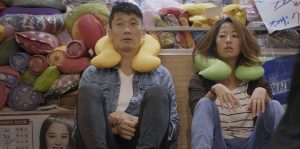
Going to film festivals can present serendipitous moments from the simple act of killing time before the film you really want to see screens in a few hours. Such was the case when I stumbled into Malene Choi’s The Return. My connection with it was instantaneous being a father of an adopted child from South Korea. The Return is the story of two Danish-Korean adoptee adults returning to South Korea in search of their birth parents.
Shot as a hybrid documentary-narrative, the film opens with Karoline (Karoline Sofie Lee) arriving in Seoul for the first time. She finds her way to Karoot, a hostel/BNB specifically for adoptees to stay while they search for their birth parents. It is at Karoot that Karoline finds support from other guests with similar goals, including fellow Dane, Thomas (Thomas Hwan).
Here director Choi essentially lays out the search process in her narrative. Karoline’s first stop is to Holt International, the agency that facilitated her adoption, in hopes they located her parents prior to her visit. There she is told that aside from the paperwork they had on file, her history no longer exists. This visit is the first of many roadblocks Karoline faces.

“…two Danish-Korean adoptee adults returning to South Korea in search of their birth parents.”
Returning to Karoot, she speaks with her peers, all with various stories of success and failure in their search. Seeing Karoline’s frustration, Thomas tells her that the caseworker at Holt is not interested in helping her since this is a business and once the transaction is complete, their obligation to the child ends. He offers to accompany Karoline to a second appointment for moral support.
For Thomas, he is ultimately able to locate his birth mother. Reluctantly seizing the moment, Thomas visits his mother for the first time along with Karoline. Nervous is a gross understatement about Thomas’ feelings about the reunion. After a quick smoke, which we witness to its last puff, Thomas reunites with his mother and hears the story of why she gave him up for adoption. A story that forced me to pause and wonder about my own adopted daughter and the story I was told about her birth.
The funny thing about Malene Choi’s The Return was about 30 minutes in, I was still wondering if this was a documentary or not. Both answers are true. This is in part to Karoline Sofie Lee and Thomas Hwan’s authentic yet subtle performances. Their acting is grounded, never rising to melodrama. In other words, it feels real, and it feels personal. Like Bowfinger and Borat, many of the film’s supporting cast are under the impression they’re appearing in a documentary but unknowingly cast in actual roles in the narrative.
Keeping their performances grounded allows its civilian subjects never to feel like they’re being trapped or give a less-than-honest performance on camera. The best example of this is the caseworker from Holt explaining to Karoline why they never contacted the hospital and then witness the gradual rise in the caseworker’s frustration with the entire conversation. The whole exchange is real and unscripted.

“…many of the film’s supporting cast are under the impression they’re appearing in a documentary but unknowingly cast in actual roles…”
In other moments, Karoline has conversations with other adoptees at Karoot. One involves an American Korean who decided to move to Korea because he felt more of a connection there than in the States. Another adoptee was forced to choose between searching for his birth parents or be banished from his adopted family. Another features a woman whose first contact with her birth father left her less than excited.
Choi’s style of filmmaking is fascinating as well. Transitions from moment to moment are abrupt and sometimes jarring. Improvised conversations/interviews feature jumpcuts to manage its pace. The music is strange but oddly works. Choi’s final product felt like if Christopher Guest decided to tell a straight drama using his improvised techniques from Best In Show and Waiting for Guffman.
Ultimately, Choi is shining a light on transnational adoption, not only in South Korea, but in other countries as well. The idea that Western parents are saving children from a life of poverty and neglect from “shithole” countries, may not be 100% true. For me personally, it forces me to be hyper-vigilant in the way I talk about her birth country and the truth of her origin story.

The Return (2018) Directed by Malene Choi. Written by Sissel Dalsgaard Thomsen. Starring Karoline Sofie Lee, Thomas Hwan. The Return screened at the 2018 AFI Film Festival.
7 out of 10 stars

